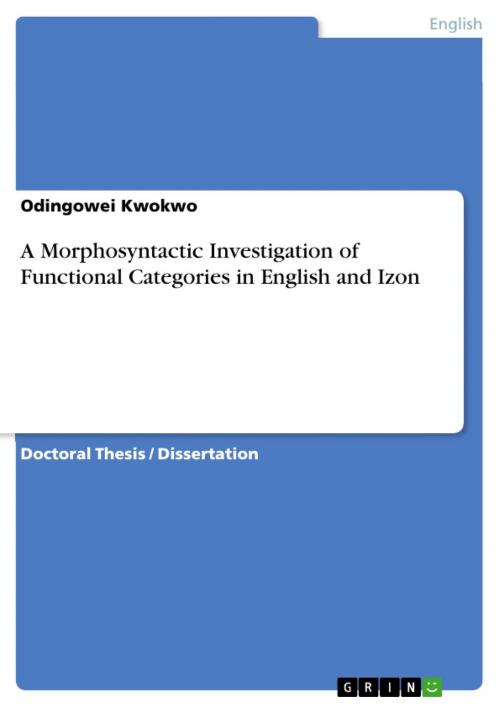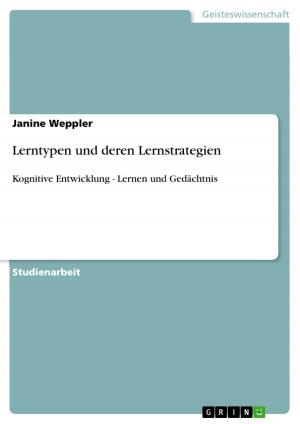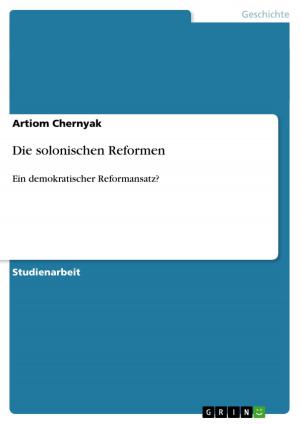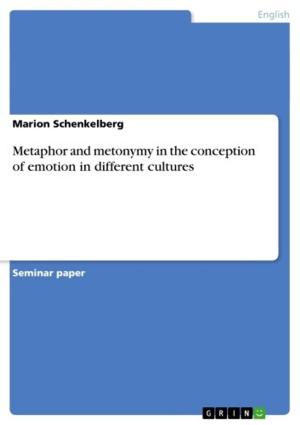A Morphosyntactic Investigation of Functional Categories in English and Izon
Nonfiction, Entertainment, Drama, Anthologies| Author: | Odingowei Kwokwo | ISBN: | 9783668140202 |
| Publisher: | GRIN Verlag | Publication: | February 4, 2016 |
| Imprint: | GRIN Verlag | Language: | English |
| Author: | Odingowei Kwokwo |
| ISBN: | 9783668140202 |
| Publisher: | GRIN Verlag |
| Publication: | February 4, 2016 |
| Imprint: | GRIN Verlag |
| Language: | English |
Doctoral Thesis / Dissertation from the year 2012 in the subject English Language and Literature Studies - Linguistics, University of Ibadan, language: English, abstract: Existing studies on Izon language have concentrated on unilingual application of traditional grammar in constructing well-formed sentences, thereby neglecting critical descriptions of the ways morphosyntactic features ensure the derivation of convergent structures. A contrastive examination of English, (a standard for universal grammar analysis) and Izonn languages can properly characterise these syntactically significant features. This work, therefore, investigates the morphosyntactic features in English and Izon languages with a view to identifying and describing the morphosyntactic features that make the structures of the two languages converge. The study adopts Chomsky's Minimalist Program, which emphasises checking of morphological features. The research is based on Standard English and the Kolokuma dialect of Izon, used in education and the media, and is mutually intelligible with other dialects. Data on English were collected from various books on English grammar and those on Izon were collected from native speakers in Kolokuma and Opokuma clans in Bayelsa State where the dialect is spoken, and complemented with the researcher's native-speaker's introspective data. Since the study is competence-based, completely grammatical structures from each language were used for the analysis. Clausal and phrasal syntactic structures of English and Izon languages were comparatively analysed based on the feature-checking processes of the Minimalist Program to identify shared and idiosyncratic features. Universal features common to both languages include phrases, clauses, syntactic heads and wh-fronting. However, English and Izon opt for different head parameters. Heads in English precede their complements while heads in Izon follow their complements. Although Nominative Case licensing occurs in Spec-head structures in both languages, Accusative Case is licensed in head-complement relationship in English and complement-head structure in Izon. Both English and Izon permit wh-fronting at Spec-CP, but Izon wh-expressions obligatorily co-occur with focus particles ki or ko, which are functional elements that licence wh-elements. Whereas English constructs relative clauses with overt and interpretable complementizers such as 'who', which precede their complement clauses, Izon constructs relative clauses without overt interpretable wh-expressions except an overt amee (that) which follows its complement clause.
Odingowei Kwokwo holds a PhD from the University of Ibadan, Nigeria. He teaches in the Department of English and Literary Studies, Niger Delta University, Nigeria.. His research interests include English Syntax, Comparative Syntax, Morphology, Stylistics and Sociolinguistics
Doctoral Thesis / Dissertation from the year 2012 in the subject English Language and Literature Studies - Linguistics, University of Ibadan, language: English, abstract: Existing studies on Izon language have concentrated on unilingual application of traditional grammar in constructing well-formed sentences, thereby neglecting critical descriptions of the ways morphosyntactic features ensure the derivation of convergent structures. A contrastive examination of English, (a standard for universal grammar analysis) and Izonn languages can properly characterise these syntactically significant features. This work, therefore, investigates the morphosyntactic features in English and Izon languages with a view to identifying and describing the morphosyntactic features that make the structures of the two languages converge. The study adopts Chomsky's Minimalist Program, which emphasises checking of morphological features. The research is based on Standard English and the Kolokuma dialect of Izon, used in education and the media, and is mutually intelligible with other dialects. Data on English were collected from various books on English grammar and those on Izon were collected from native speakers in Kolokuma and Opokuma clans in Bayelsa State where the dialect is spoken, and complemented with the researcher's native-speaker's introspective data. Since the study is competence-based, completely grammatical structures from each language were used for the analysis. Clausal and phrasal syntactic structures of English and Izon languages were comparatively analysed based on the feature-checking processes of the Minimalist Program to identify shared and idiosyncratic features. Universal features common to both languages include phrases, clauses, syntactic heads and wh-fronting. However, English and Izon opt for different head parameters. Heads in English precede their complements while heads in Izon follow their complements. Although Nominative Case licensing occurs in Spec-head structures in both languages, Accusative Case is licensed in head-complement relationship in English and complement-head structure in Izon. Both English and Izon permit wh-fronting at Spec-CP, but Izon wh-expressions obligatorily co-occur with focus particles ki or ko, which are functional elements that licence wh-elements. Whereas English constructs relative clauses with overt and interpretable complementizers such as 'who', which precede their complement clauses, Izon constructs relative clauses without overt interpretable wh-expressions except an overt amee (that) which follows its complement clause.
Odingowei Kwokwo holds a PhD from the University of Ibadan, Nigeria. He teaches in the Department of English and Literary Studies, Niger Delta University, Nigeria.. His research interests include English Syntax, Comparative Syntax, Morphology, Stylistics and Sociolinguistics















